Ahead of Fairtrade Fortnight, Beth Phillips visited a cocoa co-operative in Ghana and Sarah Butler met coffee farmers in Uganda to find out
I’m sitting in 36C heat on a rickety bench in Bayerebon No.3, a small village in the Ashanti region of South West Ghana, surrounded by what appears to be its entire population.
I’ve travelled for more than three hours, first through the bustling streets of Kumasi, Ghana’s second-largest city, and then along deep red dusty tracks winding through thick jungle to reach the village and find out what difference Fairtrade has made to this rural community.
Among the welcoming committee, there isn’t a child in sight. That’s because Bayerebon No.3 boasts a school attended by 600 local kids one that was built by Ghanaian cocoa co-op Kuapa Kokoo in 2000. It is a sad fact of life that child labour is a major problem in the African cocoa industry and the school is one of many ways the co-op is hoping to stamp it out.
That hasn’t stopped it coming under scrutiny. Fairtrade has been investigated a number of times in the past few years and Kuapa Kokoo, which makes Divine chocolate and also supplies cocoa to Cadbury and own label, was thrust under the spotlight last March. A Panorama documentary claimed it had found evidence of child labour within the co-operative and that Kuapa Kokoo had been forced to suspend a number of its village ‘societies’.
At Kuapa Kokoo’s HQ in Kumasi, the co-operative’s new president Christiana Agyare tells me the society was “gutted” about the revelations because it had been working so hard to tackle child labour.
Having put in place a remedial plan for the affected societies, which were reinstated last January, it is now hoping to put the past behind it by continuing the roll out of a new Child Labour programme.
Last June, a taskforce made up of community members and representatives from Kuapa Kokoo toured villages in the western region of Ghana to identify children at risk from exploitation and stop it happening. The taskforce did not identify any children at risk within Kuapa Kokoo (although it did highlight a number of children who were not part of the co-op). To prevent problems occurring within Kuapa Kokoo’s 1,300 societies, it decided to roll the pilot out.
The taskforce has now visited 28 of them and last month the International Labour Organisation donated $100,000 to enable them to assess a further 15. The hope is that eventually the scheme will be extended to all districts in western Ghana, which is particularly susceptible to child labour because it produces 50% of Ghana’s cocoa.
There is a palpable desire to get rid of such abuses and improve children’s lives. Back at Bayerebon No.3, the school is clearly central to the local community. Kids travel from six neighbouring villages to attend. As well as educating them, the school is also giving them hope for the future.
When I ask them what they want to be, tellingly none of them reply “cocoa farmer”. They all want to be doctors and teachers. Elias Mohammed, who as the Bayerebon No.3 recorder is responsible for weighing and checking the cocoa, tells me that thanks to Kuapa Kokoo he was able to send his five children to the school. Two are now at secondary school.
It’s not just kids who are benefiting. In the same village, I meet a woman busy raking the thousands of cocoa beans that lie drying on long wooden racks. As she works, she tells me that women have also been “empowered”. “We can earn our own living and not be so dependent on our men,” she says.
In another Kuapa Kokoo village, Awaham, I meet Juliet, a cocoa farmer with a machete in her handbag. She tells me that through Kuapa Kokoo the village applied for a grant to buy a corn-milling machine. It was successful and the machine, installed last July, has turned what would have been a couple of hours’ work for the women of the village into a five-minute task.
These aren’t isolated examples. There’s evidence of female empowerment all over Ghana ads for a government campaign are displayed on the streets of Kumasi and in my hotel I pick up a leaflet urging women to marry for love, not money.
Kuapa Kokoo is trying to lead by example. The split between men and women on its 12-strong National Executive Council is 50:50 and in August the co-op elected its first woman president.
“We seek to promote the participation of women in our activities,” says Agyare, who joined the co-operative back in 1998 as a member.
Of course, there’s still a long way to go. It’s apparent that the villagers rarely get a chance to try or even see the final product they work so hard to create.
Everywhere I go, people describe the cocoa beans as “your cocoa beans” and when Divine representatives offer chocolate from the UK to pupils at Bayerbon No.3, it’s gone in seconds. Indeed, I have to stop some children from eating it before they have removed the wrapper.
The Fairtrade Foundation is working hard to address the issue, says executive director Harriet Lamb. “The next stage is to change the nature of Fairtrade so the farmers feel it is theirs,” she says. “One way forward is for farmers to create their own brands and to market them in their own countries. It’s already taking off in South Africa. They don’t have to export it to the other side of the world!”
It’s an ambitious plan, but Lamb believes that by targeting tourists, expats and then the burgeoning middle classes, Fairtrade can grow in Africa. Hopefully, one day the villagers of Bayerbon No.3 too will be able to eat the chocolate made using their cocoa beans.
Kuapa Kokoo – the lowdown Kuapa Kokoo was launched in 1993 after the IMF made moves to liberalise the corrupt, government-controlled Ghanaian cocoa industry.
Its aim is to ensure a fair price for its 45,000 members cocoa farmers in more than 1,300 village societies. Each society appoints a recorder to weigh and check each 64kg sack of cocoa, which is then marked with the village’s unique ID number and sent to one of the many district depots.
There it is checked for quality and moisture content and sent on to a ports to make its way to Europe. Today 61% of Kuapa Kokoo’s sales are Fairtrade, a figure that’s shot up in recent years thanks to companies like Cadbury.
Each society receives a premium from Kuapa Kokoo Fairtrade activities, which have funded 302 wells, 34 milling machines and seven schools. Farmers also receive machetes and healthcare.
Instant coffee has not been an instant hit for Fairtrade, reports Sarah Butler from Mbale, UgandaMost of the world may be fretting about rising food inflation, but not George Kusolo. He is a coffee farmer and he’s delighted with the soaring prices commanded by the organic beans he grows on his modest hillside plot close to Mount Elgon in eastern Uganda.As a Fairtrade grower, he’s also pleased Fairtrade coffee has gone so mainstream. Fairtrade-certifi ed coffee was one of the fi rst three Fairtrade products launched by the foundation and is now the third biggest selling Fairtrade category, behind bananas and sugar.Having started out very much as a niche proposition 16 years ago when the Fairtrade Foundation was launched, it now accounts for 12.2% of the UK coffee market and the own-labelling offerings from Marks & Spencer, Sainsbury’s, The Co-op and Morrisons are all Fairtrade.The foundation has set out its stall to nearly double its share of the overall coffee market to 20% by next year, increasing household penetration from 20% to 50% in the process. But there’s a fl y in the ointment, in the form of instant coffee.Fairtrade-certified coffee currently only accounts for 2.5% of instant coffee sales and there is little sign that the situation is about to improve.The fledgling sub-category has endured decidedly mixed fortunes of late. Last year, Asda shook up its Fairtrade hot beverages line-up, delisting instant coffees from Café Direct and Clipper. Elsewhere the picture looks equally depressing for the organisation, with the dominant players in the instant coffee category shunning the Fairtrade mark in favour of rival ethical label Rainforest Alliance.Kenco, which represents about 19% of UK instant coffee sales according to SymphonyIRI, already partners with the Rainforest Alliance. And Nestlé, which looked to Fairtrade when sourcing cocoa for its Kit Kat brand and for the launch of its specialist Partners’ Blend Nescafé Fairtrade coffee, announced this summer its intention to source 90,000 tonnes of Nescafé coffee according to Rainforest Alliance and Sustainable Agriculture Network (SAN) principles by 2020.Fairtrade acknowledges that it faces a problem. It admits that the highly commodotised and competitive nature of the instant coffee sector has made it difficult to persuade brands to pay the extra for Fairtrade-sourced beans.
The problem has been further exacerbated by the soaring price of mild Arabica coffee beans, which this month hit a high of $2.78 a pound.To address the issue, Fairtrade plans to court more major supermarkets and major household brands in the months ahead, according to Richard Anstead, head of grocery product management at Fairtrade. He points to Kenco’s tie-up with the Rainforest Alliance as evidence of “growing awareness of sustainability and ethical issues in the coffee sector” and that “brands are waking up to the fact that ethical sourcing is not just the right thing to do but is an important part of their business plan to keep coffee coming in”.As a result, he believes there are plenty of growth opportunities for the organisation to exploit. “Our producers are only selling an average 10% to 15% of their yield to Fairtrade. Even if we could raise Fairtrade’s share of the instant coffee market to 6% it would double the amount of coffee producers are selling into that market,” he says. While two or three retailers continue to lead the market, an opportunity remains for those who have so far been less committed to going down the Fairtrade route.“Supermarkets could do more to close the gap on what we think consumer demand is for own label and what consumers see in stores,” he says.Tesco, for example, has historically shied away from Fairtrade coffee. Despite being the UK’s largest supermarket, its own-label Fairtrade coffee accounts for just 0.7% of the roast and ground market by value against 8.6% for its ordinary own-label and 12.9% for Sainsbury’s Fairtrade products, according to SymphonyIRI.Sainsbury’s heads the way when it comes to Fairtrade coffee sales and intends to bolster its offer through the introduction of a Fairtrade product sourced from the confl ict-affected Congo as part of a Comic Relief-backed project during Fairtrade Fortnight, which kicks off on Monday.Even Asda launched an own-label Extra Special Fairtrade instant coffee recently and announced plans to increase its Café Direct range with five roast and ground SKUs.So while the outlook could be better it’s not all doom and gloom. Fairtrade’s aim to wave its flag over a fifth of the UK coffee market may be ambitious, but the need to invest in a sustainable supply chain could ultimately help to swing the argument.If the organisation achieves its target of a 20% share of the UK coffee market it would be good news for farmers like George Kusolo. He’s put the extra money that he’s already earned from growing Fairtrade beans to good use, installing a new metal roof on his house and sending his youngest child to school.The extra 6,257 tonnes of coffee per annum that Fairtrade requires smallholders to generate to hit its target will help to sustain generations of Kusolos for years to come.
No mountain too high for UK food
It towers nearly 6,000m above the East African savanna, climbs through several ecosystems and is the world’s tallest free standing mountain rise. Now Mt Kilimanjaro is set to be tackled by British food and drink’s leading lights. The intrepid team of 12 – led by former NFU director general Richard MacDonald and including Sainsbury’s commercial director Mike Coupe, FSA CEO Tim Smith and The Grocer’s publisher Charles Reed – are lacing up their boots for charity FARM-Africa in September.FARM-Africa improves the livelihoods of East African farmers by providing strategic training to help them manage and sustain their resources and allowing them to go beyond subsistence farming and making a living through their land and livestock.“This is a chance to show that the food industry cares about more than just the bottom line,” says MacDonald. “We want to raise a decent sum of money for FARMAfrica – a very worthy charity that’s closely linked to us in the food industry.”Fundraising will be chiefly through corporate sponsorship packages, which will include invitations to an exclusive pre-expedition dinner. Sponsors will also feature in campaign ads in The Grocer and other William Reed titles. “This is about UK Food plc supporting and raising money for a very important charity that supports African farmers,” says Reed. “It’s as much about raising awareness as it is money.”Contact 0207 430 0440 or kiliclimb@farmafrica.org.uk to sponsor.
Sign in to comment on this article
Not logged in before? Register for FREE guest access today.
You will be able to:
- Read more stories
- Receive daily newsletters
- Comment on stories
Advert







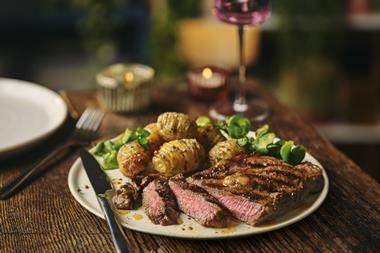
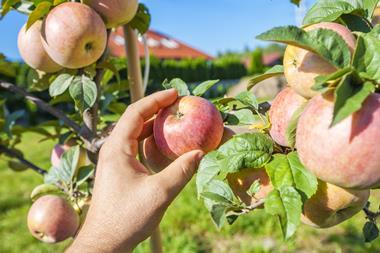
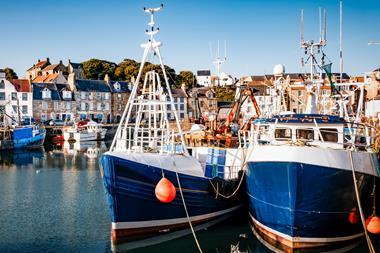
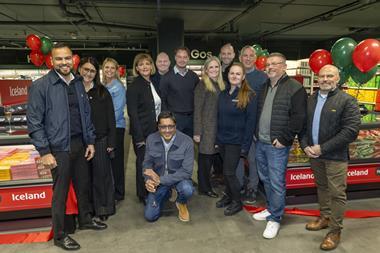
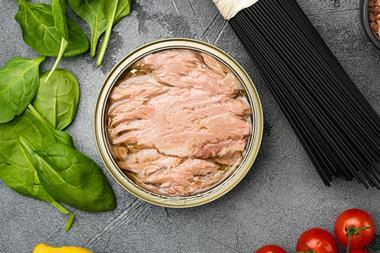






No comments yet